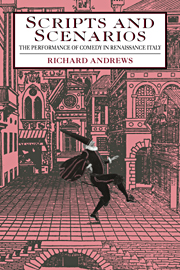Book contents
- Frontmatter
- Contents
- Preface
- Introduction: Italy in the sixteenth century
- 1 Precedents
- 2 The first ‘regular’ comedies
- 3 The second quarter-century, outside Venice
- 4 The second quarter-century, Venice and Padua
- 5 Improvised comedy
- 6 Obstacles to comedy
- 7 Scripts and scenarios
- Notes
- Chronological bibliography of comedies, 1500–1560
- General bibliography
- Index
Preface
Published online by Cambridge University Press: 29 October 2009
- Frontmatter
- Contents
- Preface
- Introduction: Italy in the sixteenth century
- 1 Precedents
- 2 The first ‘regular’ comedies
- 3 The second quarter-century, outside Venice
- 4 The second quarter-century, Venice and Padua
- 5 Improvised comedy
- 6 Obstacles to comedy
- 7 Scripts and scenarios
- Notes
- Chronological bibliography of comedies, 1500–1560
- General bibliography
- Index
Summary
Theatre historians recognize in general terms that it was the Italians, in the early sixteenth century, who took the first steps towards a modern European concept of theatre – paradoxically, by reviving models which were sometimes two thousand years old. But the plays which were produced in the process – initially almost always in the form of comedy – are relatively neglected outside Italy. In English they tend to be treated either dismissively, or with emphasis on their sources rather than their qualities as an innovative, if sometimes immature, form of theatre. This can leave behind a misleading picture, both of scripted ‘erudite’ comedy as such, and of the extent to which commedia dell'arte (better known, and more romantically approved of) actually depended on commedia erudita for its raw material and its very existence. One of the aims of the present study is to give a simple account of this whole seminal process, taking things as much as possible in their chronological order. In the writing, it emerged that the story was too long for one book. This one can claim to cover with reasonable thoroughness the period from 1500 to the 1550s, a decade which it is convenient to treat as a watershed. Commedia dell'arte had probably begun by then to take on a separate identity; and other cultural changes were in process which can be seen as concluding what can usefully be called the ‘Renaissance’ in Italy. Hence I can justify the use in the sub-title of the term ‘Renaissance’, rather than the ‘sixteenth century’ which had originally been proposed.
Information
- Type
- Chapter
- Information
- Scripts and ScenariosThe Performance of Comedy in Renaissance Italy, pp. xi - xivPublisher: Cambridge University PressPrint publication year: 1993
